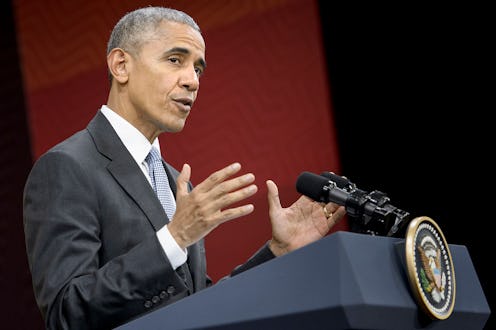News
Obama Has Commuted A Record Number Of Sentences
During his second term, President Barack Obama made a goal of reducing the number of nonviolent drug offenders in prison. Since then, Obama has granted a historic number of commutations to federal prisoners with such charges. On Tuesday, he added 79 commutations to his list, bringing the total under his administration to 1,023. For comparison's sake, George W. Bush issued 11 commutations, and Bill Clinton, 61, NBC News reported. In a statement on the commutations — or, reduction of sentences — Obama expressed the need for more to be done, structurally, to address the problem of people in prison who he thinks deserve second chances.
"Now it's up to good minds on both sides of the aisle to come together to restore fairness in our criminal justice system, use our tax dollars more effectively, and give second chances to those who have earned them," Obama said. He pointed to the need to address criminal justice and mass incarceration on the level of legislation, and not only because we might not expect the next POTUS, who touted "law and order" rhetoric during his campaign, to issue commutations. Presidential commutations are out of reach for a substantial number of prisoners in the United States who are incarcerated on drug charges, many of them nonviolent.
According to the most recent Federal Bureau of Prisons data earlier this fall, about 46 percent of federal prisoners are incarcerated due to drug charges — or, 83,271 people (this data is not sorted into violent and nonviolent offenses). The vast majority of prisoners in the United States are held in state prisons — as The Washington Post reported, about 86 percent of the prison population. And of those, 17 percent are incarcerated for nonviolent drug offenses. The president doesn't have authority to grant commutations in most states.
Both Democratic presidential nominees in 2016 spoke up in support of reforming the mandatory minimum sentencing legislation that takes decision-making power and individual considerations out of the sentencing process. Both the Republican and Democratic Party platforms mention such reforms, with the Republican platform specifying they should be considered in cases of nonviolent drug offenses. That, along with a move away from punishing use of drugs and toward treatment of addiction, would be the kind of structural change to keep a number of people out of prison for long periods of time, or for any time at all.
Whether the next president or Congress takes up criminal justice reform and the mass incarceration issue remains to be seen. Based on the parties' platforms, there is common ground on which to build. For his part, Obama hopes the momentum he's created with his record-breaking commutations will carry on.
